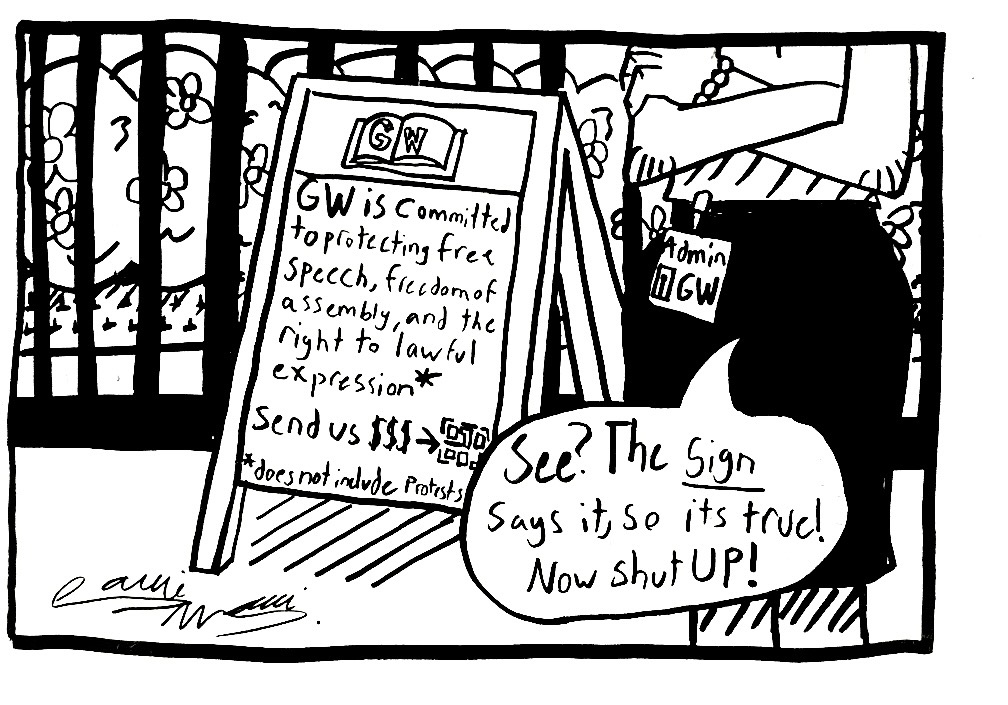I view D.C.’s Initiative 83 as a band-aid over a bullet wound.
I-83 is a two-pronged ballot initiative on the ticket in D.C. this election cycle. If passed, the measure would let registered independents vote in the party primary of their choosing. It would also put ranked-choice voting in place for all city elections, in which voters rank their preferred candidates from No. 1 to No. however-many-people-ran-for-office. Election officials would eliminate the bottom-ranking candidate during each “round” of tabulation, with voters who placed that candidate first now having their second-place choice counted, until one candidate has a majority of votes.
The initiative is abstractly positive and in theory, a series of good ideas. Ensuring that the winner of an election received a majority of votes adheres with every rosy ideal of democracy. But it ignores the realities of D.C. as an overwhelmingly Democratic city, and I worry that it will be ineffective as a result. D.C. is a one-party town, and its general elections, which have a higher voter turnout than its primaries, are not competitive.
There’s no chance for a mass group of D.C. voters to hold the election winners accountable. All the general body of voters get to do is give a rubber stamp to the elected official, which begs the question of their legitimacy. Any attempt at electoral reform that wants to promote democracy and competitive elections needs to recognize that — which I-83 fails to do by continuing to silo off decisive District elections in primaries.
Sure, letting independents vote in the Democratic primary will in some small sense boost the total representation those ultimately decisive elections have. But is ranked-choice voting going to make more people vote in primaries? Is ranked-choice voting going to make primaries less confusing? I doubt it — after all, the measure does not purport to touch those issues at all. The point of I-83 is to promote democratic values in D.C., but the initiative ignores the main issue of the District’s democracy, which is that voters don’t get to choose between viable alternatives in general elections.
The real Election Day each year in D.C. isn’t in November, but in June, when the District typically holds primaries. Just look at 2022: Incumbent Democratic Mayor Muriel Bowser received about 30,000 more votes in the noncompetitive general election than all candidates did in the much closer Democratic primary where she eked out a 9-point win. Regardless of if you like Bowser, it’s ridiculous and antidemocratic that someone can be mayor for three terms without ever sniffing a truly competitive election where everyone in D.C. has a chance to vote.
As the above example illustrates, in the District, whoever wins the Democratic primary for all intents and purposes wins the election, and yet far fewer people vote in said primaries than in the noncompetitive general election. That’s a problem for any leader claiming to have the consent of the governed because, in a major way, they don’t. They have the consent of a smaller subset of the governed who happen to be politically involved enough to vote in a primary election and then the reluctant acquiescence of the mass of the governed in the general election. To achieve a real, classically democratic majority, they’d need a majority of people in the most open election — the general — to vote for them over another viable alternative. That doesn’t happen in D.C. when the general election is between a Democrat and a Republican. There are all sorts of plausible theories for why people don’t vote in primary elections and each has corresponding plausible solutions. Some research has suggested it’s because people feel the stakes are lower.
In that way, I-83 helps the injury of undemocratic elections in the District, but in reality, it’s an insufficient solution that ignores the severity of the wound.
A commonly advanced method of expanding the influence of primaries is instituting jungle primaries, which are in place in heavily Democratic states, like California and Washington. In these cases, primary voters choose between a massive field of candidates, and the top two advance to the general election regardless of party. That way, you guarantee the winner of the general election gets a majority, while also allowing for competitive general elections in one-party areas. In California in 2018, for example, there was a competitive general Senate election between two Democrats as a result of this system.
I don’t view this method as a one-size-fits-all solution, since in a jungle primary, the top two candidates could advance with something like 25 percent of the primary vote each. But a jungle primary combined with ranked choice voting would be a better fit to the actual circumstances of D.C. than what I-83 tries to put forth. In this scenario, you’re guaranteeing that whoever advances from the primary would be a majority of voters’ top two choices, while also leaving open the possibility of a competitive general election that forces politicians to be more accountable to their constituents.
The only truly competitive elections in the District can’t just be obscure primaries in June — they need to be the main election that voters are participating in each November.
With all that said, I’m still going to vote yes on I-83. In an abstract, Tocquevllian conception of republican government, particularly on the local level, politicians do need the “consent of the governed,” the eager acquiescence of a majority of their constituents to their leadership. I view the initiative’s goals as “absolute” positives — politicians actually representing a majority of their constituents is good for democracy, and more people getting a chance to choose their representatives is good too. But I-83 isn’t addressing the fundamental issues in D.C. voting. Until reform makes general elections more competitive, the wound in the District’s democracy will just keep bleeding.
Nick Perkins, a senior majoring in political science, is the culture editor.


